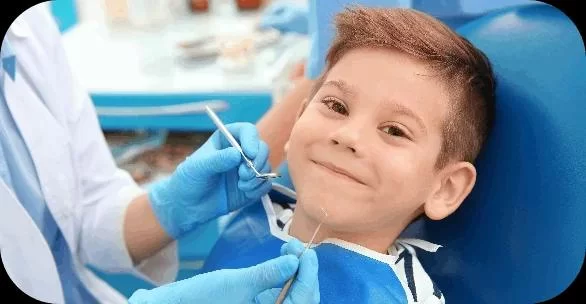
- why-child-dental-care-matters
- establishing-good-dental-habits-early
- navigating-common-child-dental-issues
- real-parenting-stories-on-dental-care-struggles
- professional-tips-and-dentistry-toothtruth-support
1. Why Child Dental Care Matters
Understanding how to take care of your child’s dental health is about more than preventing cavities—it's about setting a foundation for lifelong oral wellness. Baby teeth, though temporary, play a vital role in speech development, proper chewing, and guiding permanent teeth into position. Neglecting early dental care can lead to infections, misaligned bites, and low self-esteem from dental pain or visible issues.
The habits children develop in their early years are likely to follow them into adulthood. That’s why starting dental hygiene practices at home before the first tooth even appears is one of the best investments you can make for your child’s future.
2. Establishing Good Dental Habits Early
Dental care begins before a child’s first birthday. Wiping a baby’s gums with a clean, damp cloth helps remove bacteria and introduces them to the idea of mouth care. Once that first tooth comes in, it’s time for brushing—using a soft-bristled toothbrush and a rice-sized amount of fluoride toothpaste.
By age three, children should be brushing twice daily, ideally with parental guidance. Making brushing fun—through music, stories, or colorful brushes—can help create a routine kids actually look forward to. It's also a great time to explain why brushing and flossing matter in a way they can understand.
Building these routines doesn't have to be overwhelming. At Dentistry Toothtruth, we provide age-specific toothbrushes, gentle toothpastes, and flossing tools to help parents create a consistent, child-friendly oral hygiene routine.
3. Navigating Common Child Dental Issues
Children are especially prone to certain dental issues—like early childhood caries (baby bottle tooth decay), thumb-sucking effects, or sensitivity due to erupting teeth. Recognizing the signs early is crucial. White spots on teeth, bad breath, or irritability while eating could all be signs that something isn’t right.
One growing concern is the overconsumption of sugary snacks and drinks, which dramatically increases the risk of decay. Replace juice boxes with water, and limit sticky snacks that cling to teeth. Teaching children to rinse with water after meals is a simple habit that supports long-term oral health.
Regular dental checkups—starting by age one—help detect problems early and reduce anxiety around dental visits. Pediatric dentists are trained to handle children’s unique dental needs in a comforting and educational way.
4. Real Parenting Stories on Dental Care Struggles
Anna, a mother of two, shared how difficult it was to get her 5-year-old to brush regularly. “Every night was a battle,” she recalls. “He hated the taste of mint toothpaste.” After trying a strawberry-flavored alternative and letting him pick his own toothbrush with cartoon characters, brushing became something he looked forward to.
In another case, Leo’s parents didn’t realize his bedtime bottle of milk was contributing to decay until a routine dental checkup revealed four small cavities. “We thought milk was healthy,” they said, “but we didn’t know it could pool around the teeth during sleep.” Their dentist recommended switching to water and introducing floss picks, which helped reverse early-stage decay.
These stories show that even small changes—guided by the right information—can make a big difference in protecting kids' smiles.
5. Professional Tips and Dentistry Toothtruth Support
Experts emphasize that parents play the most important role in their child's dental development. Dr. Marissa Cole, a pediatric dentist, encourages parents to “lead by example. Brush and floss together—it turns a chore into family time.” She also stresses the importance of celebrating dental milestones, like a cavity-free checkup or successful flossing.
Fluoride is another key element—whether in toothpaste or from professional treatments. It strengthens enamel and helps prevent cavities. Parents should also be aware of mouthguard options if their child plays sports, as injuries to baby teeth can have lasting impacts.
At Dentistry Toothtruth, we understand that no two children are the same. That’s why we offer tailored solutions—from gentle toothbrush sets to step-by-step dental kits—designed to make every stage of a child’s oral development easier and more enjoyable. If you're unsure where to start, our team can help guide you to the best options based on your child's age and needs.
Creating strong dental habits now builds the confidence and health your child will carry for a lifetime. Start today—with patience, the right tools, and the support that makes all the difference.







 East Brunswick Family Dental4.0 (679 review)
East Brunswick Family Dental4.0 (679 review) Children's Dental Health of Downingtown4.0 (658 review)
Children's Dental Health of Downingtown4.0 (658 review) Kidz R Kool Pediatric Dentistry4.0 (661 review)
Kidz R Kool Pediatric Dentistry4.0 (661 review) Shore Dental Arts, P.A.5.0 (717 review)
Shore Dental Arts, P.A.5.0 (717 review) Leesville Dental Studio4.0 (473 review)
Leesville Dental Studio4.0 (473 review) Pratte John DDS4.0 (15 review)
Pratte John DDS4.0 (15 review) The Importance of Oral Health Education During Pregnancy for a Healthy Pregnancy
The Importance of Oral Health Education During Pregnancy for a Healthy Pregnancy Best Tips for Brushing Your Teeth Properly for Healthy Gums: Essential Techniques for Oral Health
Best Tips for Brushing Your Teeth Properly for Healthy Gums: Essential Techniques for Oral Health Why Skipping Dental Checkups Can Lead to Bigger Oral Health Problems
Why Skipping Dental Checkups Can Lead to Bigger Oral Health Problems Advantages of Porcelain Dental Restorations
Advantages of Porcelain Dental Restorations How Can Diabetes Cause Tooth and Gum Problems? Preventing and Managing Oral Health Issues
How Can Diabetes Cause Tooth and Gum Problems? Preventing and Managing Oral Health Issues Healthy Habits for Promoting Good Oral Health and Hygiene: Tips for a Healthy Smile
Healthy Habits for Promoting Good Oral Health and Hygiene: Tips for a Healthy Smile